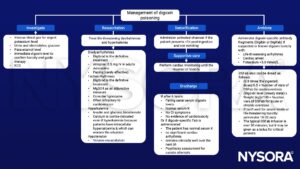Learning objectives
- Diagnose and treat digoxin toxicity
Definition and mechanisms
- Digoxin is a cardiac glycoside indicated for the treatment of chronic heart failure and persistent atrial fibrillation as it has inotropic effects
- Digoxin toxicity can present acutely after an overdose or chronically
- Toxicity can also occur from exposure to a number of plants and animals that contain cardioactive corticosteroids, including dogbane, foxglove, lily of the valley, oleander, yellow oleander, red quill, and the Bufo species toad
- In therapeutic doses (0.5-0.9 ng/mL), digoxin increases cardiac contractility and controls the heart rate
- Because of the narrow therapeutic index, chronic toxicity is more likely in the elderly and those with renal impairment
- Digoxin inhibits by poisoning the sodium-potassium ATPase and the subsequent increase in intracellular sodium leads to increased intracellular calcium as calcium expulsion through the sodium-calcium, cation exchanger is reduced because of this
- Higher intracellular calcium increases inotropy which can be of symptomatic benefit in CHF
Signs and symptoms
| Acute ingestion | |
| Gastrointestinal tract | Anorexia Nausea Vomiting Diarrhea Abdominal pain |
| Metabolic system | Hyperkalemia |
| Cardiovascular system | Enhanced automaticity: atrial tachycardia (e.g. flutter, Atrial fibrillation (AF)) with AV block, VF, VT, ventricular ectopic beats Bradyarrhythmias: conduction delays/blocks, slow or regularised AF Hypotension Shock |
| Central nervous system | Lethargy Confusion |
| Chronic ingestion | |
| Fatigue Malaise Visual disturbances: blurred vision, color disturbances, haloes, and scotomas |
Risk factors
- Low potassium
- Low magnesium
- High calcium
Diagnosis
- ECG
- Premature ventricular betas (PVCs)
- Sinus bradycardia
- Trigeminal rhythms
- Ventricular bigeminy
- Bidirectional ventricular tachycardia
- Laboratory tests
- Hyperkalemia is characteristic of digoxin toxicity
- Digoxin levels
Management

Suggested reading
- Pincus M. Management of digoxin toxicity. Aust Prescr. 2016;39(1):18-20.
- Levine M, O’Connor A. Digitalis (cardiac glycoside) poisoning. UpToDate. 2016.
- Kotzé, A., Howell, S.J., 2008. Heart failure: pathophysiology, risk assessment, community management and anaesthesia. Continuing Education in Anaesthesia Critical Care & Pain 8, 161–166.
We would love to hear from you. If you should detect any errors, email us customerservice@nysora.com